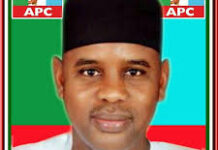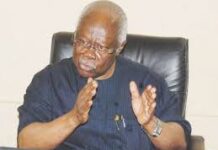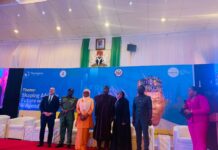Nigeria’s Judiciary is Corrupt, Vulnerable to Compromise -Senate
POLITICS DIGEST – The Nigerian Senate on Monday has decried the deep corruption rooted in the nation’s judiciary, saying that even saints sent from heaven could not cleanse the sector of the rot at the moment.
The apex legislative chamber, however, said that the corruption in the judiciary, particularly in the area of dispensation of justice, was a function of persistent neglect and poor funding of the sector by successive governments.
Consequently, the Senate urged the executive arm of government to map out special intervention fund for the judicial arm to enable it function effectively and efficiently.
The Chairman, Senate Committee on Judiciary, Human Rights and Legal Matters, Opeyemi Bamidele (APC, Ekiti Central), made these statements after a confirmation hearing his committee had with Hon. Justice John Tsoho and Hon. Justice Benedict Bakwaoh Kanyip.
Justice Tsoho’s nomination as Hon. Chief Judge, Federal High Court and Justice Kanyip’s nomination as President, National Industrial Court of Nigeria, were forwarded to the Senate for confirmation by President Muhammadu Buhari last week.
In his remarks, Senator Bamidele, who focused on submissions made by the justices during the confirmation hearing session, said that the judiciary was vulnerable to compromise based on realities on ground with respect to paucity of funds.
He asserted that no democracy could grow or survive with a compromised judiciary, saying that it was the very reason Nigerian Judiciary needed urgent special intervention fund.
“The problem at hand is that judiciary is corrupt and it is time for Nigeria and Nigerians to rise up in rescuing it with adequate funding.
“As it is with the nation’s judiciary today, even if saints are appointed from heaven to serve as justices and judges, it is only strength of character that can prevent them from being corrupt and dispense justice as required,” he said.
He noted that the issues are both moral and sociological, which, according to him, required extra budgetary provisions therapy.
Bamidele said: “I believe this will be an issue for both the legislative and executive arms of government to address most speedily. Beyond the current budgetary provision, a special intervention fund is necessary.
“As elected representatives of the people, it is not yet Uhuru. A lot still needs to be done.
“And for us to be able to catch up there is need for special intervention fund, details of which we believe, with the leadership of the legislature we have to work out with the executive arm of government.
Read Also:
“After the special intervention fund, we can then agree on how there can be consistent increase on an annual basis in the annual budget of the nation as far as the judiciary is concerned.
“Something urgently needs to be done about the plight of the Nigerian judiciary.
“For so long, the story has dominated our political space that our judiciary is corrupt.
“As far as we are concerned, it is time for Nigeria to change the narrative, it is time for Nigeria to show that we are serious and we understand the full and true meaning of the independence of the judiciary, a cardinal aspect of it is financial independence,” Bamidele said.
According to Bamidele, the committee interviewed Justices Tsoho and Kanyip and received explanation regarding their life, experience, qualifications, confidence and suitability to assume the positions.
He called on the two justices to do their best in providing good leadership and also join and spearhead the subtle struggle for the improvement of the welfare of judicial officers.
The committee chairman also called on the screened nominees to do all they could to ensure that the much needed reforms in the judicial sector were driven home.
“Without these reforms, all these efforts will continue to be a highway to nowhere,’’ he said.
Executive Secretary of the National Judicial Council (NJC), Ahmed Gambo Saleh, admitted the rot in the judiciary in an interview with journalists after the session.
Saleh said: “The welfare packages for judicial officers in this country are nothing to write home about. Judges’ salaries were last reviewed in 2007.”
He, however, stated that if the so-called corruption in the judiciary was weighed against what was obtainable in other systems, judiciary would be a saint.
While making his submissions in the presence of the two nominees and other justices like Binta Nyako, Okon Abang and others, Senator Bamidele, however, commended President Muhammadu Buhari, for increasing the budgetary provisions for the judiciary on yearly basis.
“Within the last four years, budgetary provisions for the judiciary have been experiencing marginal increases under the present administration. But it is not yet Uhuru, the Special Intervention Fund must come first before consistent increase on annual basis,” he stated.
Other members of the committee who attended the hearing session are Senators Chukwuka Utazi, Gabriel Suswam, Bashiru Ajibola, Peter Nwaoboshi, Okey Jev and Ibrahim Hassan Hadejia.
Justice Tsoho was, on July 26, sworn in by the Chief Justice of Nigeria, Tanko Muhammad, in an acting capacity.
His appointment followed the retirement of Justice Adamu AbdulKafarati, who attained the retirement age of 65 years on July 25

















